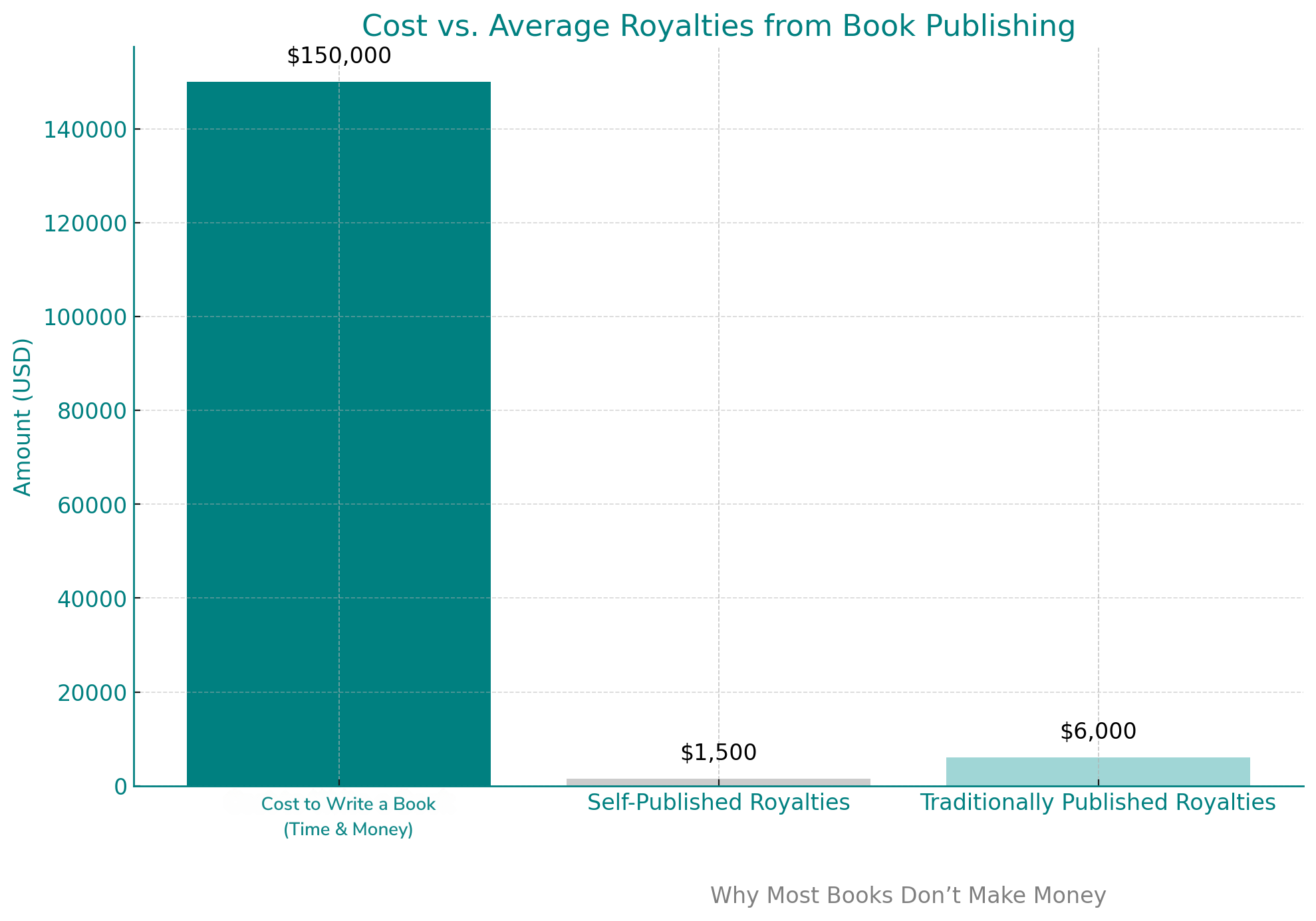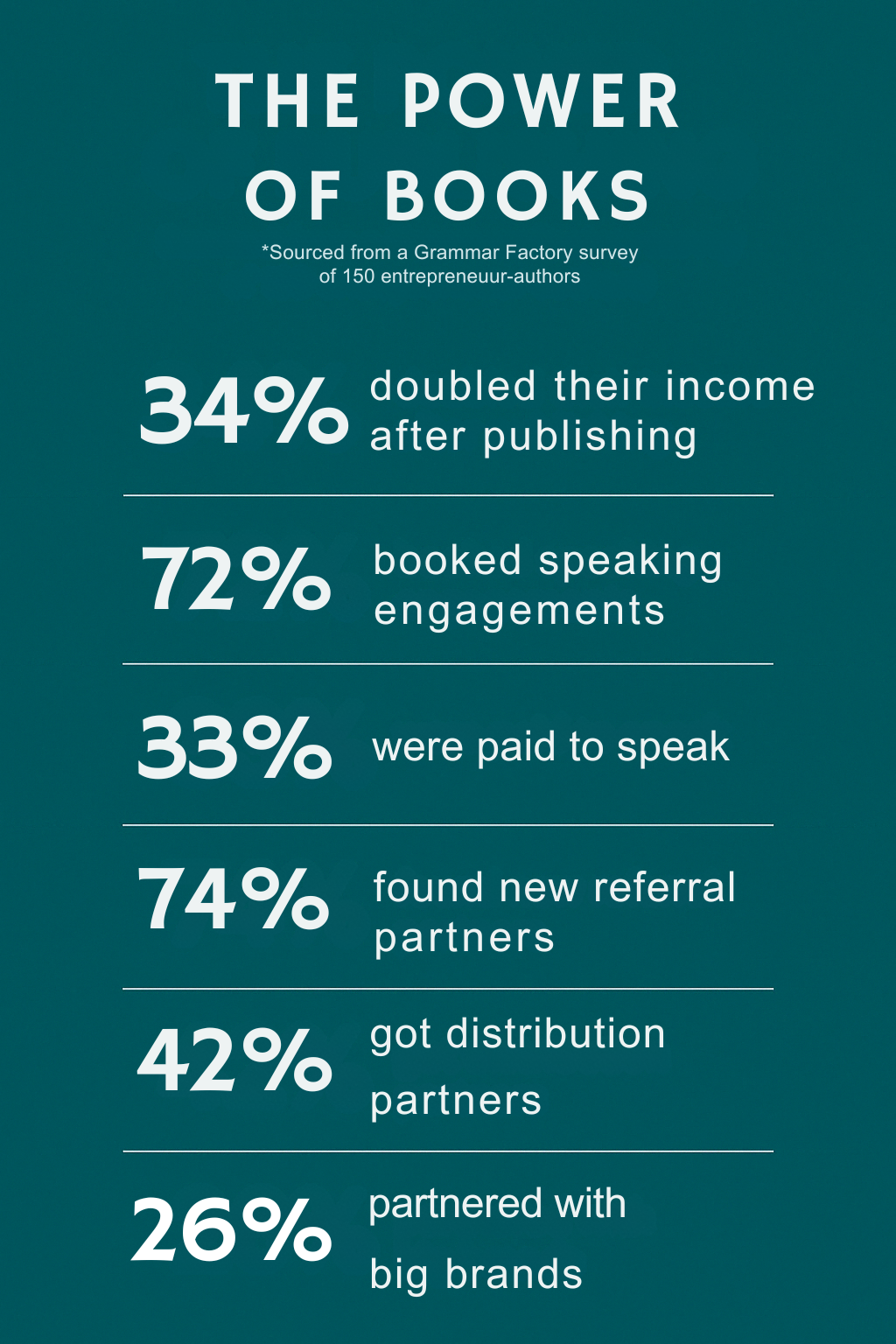Forget everything you think you know about book marketing
In the last decade, I’ve sold over 20,000 books and I’ve received 100s of positive reviews.
These numbers are more than the average author.
But these numbers are also nothing to write home about; if I subsisted on book sales alone, I’d be ordering oatmeal in bulk and living in the box it came in.
Luckily, I don’t have to stare at the Quaker Oat weirdo every time I wake.
You don’t need to sell as many books as I have to make it as an author.
And not to scare you, but you could 5x my numbers above and still not have much $$$ to show for it.
All it takes to be a successful at book marketing is one simple switch:
Transform your mindset from ↘️
I want to sell more books.
To:
Each book sale starts my ICP’s journey. (ICP: ideal customer profile)

This should be a breath of fresh air for you: You can play the “small game” and still win big.
Before we get into how to do book marketing the right way, we need to dig into what makes books unique, challenging, and honestly, so damn annoying for most book marketers.
Your book is a high-value item you can’t sell at high-ticket prices, so you have to stop doing marketing the same ol’ way.
The average person won’t spend more than $20 on a book, no matter how much blood, sweat, and eyeball juice went into its creation. And your ICP is worth much more than $20 bucks. Right?
Here’s a look at the actual cost of writing a book compared with average royalties:
Let’s say your time is worth $250 dollars an hour, and the average book takes 500+ hours to complete.
500 hours of your time spread over a year spent outlining, brainstorming, writing, researching, rewriting.
+
All the editing, publishing, and marketing costs. ($10k-$50k) and time spent researching, interviewing, and figuring all this stuff out.
=
$125-$150k to write a book yourself:
If you hire a ghostwriter to write your book with you, your total cost will be quite similar at around $125-$150k:
- ($10k-150k) for their expertise, experience, and time.
- The same editing, publishing, and marketing costs, but with recommendations based on experience.
When it’s all said and done, ghostwriting or not, you will spend roughly $125-$150k to write your book. (More or less depending on how you value your time.)
Yep, now I see your head nodding. This is why smart business professionals hire a ghostwriter and form a squad of professionals around them to help them finish their book…
But the problem is still…
Books don’t make a lot of money.

Most self-published/hybrid-published books will only sell 250 books in their lifetime.
Traditionally published books will sell around 3000 books.
Let’s say that for each option, you would get 4X results (because you’re a next-level business guru, right?).
That means you’ll sell around 1000 books if you self-publish and 12,000 books if you traditionally publish.
At a 70% average royalty, you’ll take home around $6 bucks for each self-published book you sell (generous), and at 15% average royalty, you’ll take home around $2 bucks (generous) for a traditionally published book.
So, you’ll make $6000 if you self-publish and $24,000 if you traditionally publish. *If you’re not awesome, then you’ll make $1,500 and $6,000 on average.
This is not a post about self-publishing vs. traditional publishing; It’s a look at best-case financial scenarios for authors. Many people won’t have the above experiences. Remember, we’re talking averages.
Regardless of whether you hire a ghostwriter, what publishing route you take, and whether you get better-than-average results, the math screams one salient fact: You are most likely not going to come anywhere close to recouping your costs on book sales alone.
Even if you pass 99% of authors and secure a publishing deal, and even if you happen to 4x the average results, you STILL won’t come anywhere close to breaking even.
Book marketing that focuses on book royalties alone is bad marketing.
But don’t worry, there’s hope.
Okay, okay, the following is far better than hope; it’s an actual strategy that works.
Business-minded people will find success from writing a book.
In a study conducted by Grammar Factory of 150 entrepreneurs-turned authors:
- 34% doubled their income after publishing.
- 72% booked speaking engagements.
- 33% were paid to speak.
- 74% found new referral partners.
- 42% got distribution partners.
- 26% partnered with big brands.

There is no guarantee you will hit it big when you become an author… But you’ll take the risk. Entrepreneurs always do.
5 smart ways to do book marketing in 2025
“Don’t just market your book—market the experience your book creates.” –Seth Godin
Now that you’ve shifted your mindset, you’re ready to learn the power of books and how to “market them.”
- Create a big-ticket offer: Maximize the potential of every sale
- Give your book away
- Targeted ads via Amazon, BookBub, and/or Facebook/IG
- Increase your author visibility: Work the book into your brand
- Pick a platform: Be active online
And a bonus if you stay until the end ⬇️
1) Create a big-ticket offer: Maximize the potential of every sale
“High-ticket buyers don’t want cheap solutions—they want the best outcome, fast.” – Dan Kennedy
Three questions:
- Do you have an end-of-funnel plan for recouping the cost of your time?
- How do you plan to make money with a book with such a high production cost?
- Is it worth it to you to write a nonfiction book?
If 100 of the right people buy your book (people who could become clients later on), you just stole the jump ball.
“Woah, Jordan, hold up… That’s it!?”
Yep. 100 sales to the right people and you’re already golden.
1000 sales to the wrong people, to people with no potential to work with you, will net you book royalties and nothing more.
(This is great for your publisher, if you choose the traditional option, but does little for you. And yeah, this yet another reason I’m big on the squad-publishing avenue…)
If every sale has the potential to reach your ICP, gives them valuable knowledge, and helps them on their own path AND leads them to you, you don’t need to have a positive ROI on every sale, because your overall ROI will be so black you’d need the light of a thousand dying stars to see it.
For Nonfiction Alchemy, I needed 3 ghostwriting clients to emerge, and the book covered the investment of my time and resources.
Let that sink in… 100 sales/readers. 3 clients… Not huge numbers, but HUGE results nonetheless.
And okay, my ghostwriting services are a big-ticket item…
But even if you have a few mid-tier options (like a course or a short-form coaching session), you will quickly make a positive ROI with your book—if it’s written well, helps the reader, AND points to your other offerings.
With this approach, sales numbers don’t matter as much as selling to the right people.
For your prospects: a book is a gateway to you, to your brand, and ultimately, to your higher-tiered offers.
Get crystal clear on your ideal audience and get your book in their hands.
2) Give your book away
“The best marketing plan is the one you’ll actually do.” –Rachel Herron
Many authors finish their book, put it out into the world with a big launch, and then think it’s okay to rest on their laurels and take a breather. This is hogwash. You need to keep going.
Here’s how to give more books away.
Giving books away is my favorite marketing tool for 3 reasons:
- Giving your book away to your ICP is the no-barrier-to-entry action step you can take right now.
- People LOVE to receive a free book, especially if it’s a signed paperback version mailed to their doorstep. You will impress them and they will remember you if/when the time comes and they’re looking for someone who does what you do.
- It feels good.
Charlie Tremendous Jones, the late bestselling author, gave 10s of thousands of books away in his author career. He attributed giving books away as the single best method for not only selling more books, but creating the right kinds of opportunities.
3) Targeted ads via Amazon, BookBub, and/or Facebook/IG
“The goal of advertising is not to generate a sale. The goal is to start a journey.” —Tim Grahl, author of “Your First 1000 Copies”
Ads are vital to a book’s launch and continued marketing.
But most authors can’t use them. Why? Isn’t it obvious? It’s VERY hard to get a positive ROI from book royalties with razor-thin margins.
For amazon specifically, some keywords, the keywords you should target for your audience (again, the RIGHT audience) will cost more. Some clicks will cost upwards of $1. This is a lot of money just for a click. Right? Maybe not…
If you do the above right, (and you wrote a great book) you can spend money on clicks that lead to a book sale, that lead to the sale of your other options, even if the ad cost per sale is technically in the red.
More on setting up ads here, but better to get a pro (not me) to do this for you.
4) Increase your author visibility: Work the book into your brand
“Social media is not about selling. It’s about connecting, serving, and staying relevant.” –Gary Vaynerchuk
New authors miss SO many chances to get their book in front of people
- Update all of your social media profiles with your brand and book information. Yes, you can now add the title “author.” Don’t forget this useful step.
- Make sure a purchase link or at least a call out to your book is in your email signature.
- Add your author information and profile pic to Amazon, Goodreads, and anywhere else your book is for sale.
You’re an author, ________. Now act like it. Tell the world.
5) Pick a platform: Be active online
“Marketing a book is like planting seeds. Water them consistently and patiently.” – Unknown
Many authors spend their time writing on platforms such as Medium, Quora, Reddit, Substack, etc.
I hang out on LinkedIn because A) I like the people there and B) my ICP hangs out there.
You don’t have to be everywhere online. That is a myth. It’s not sustainable and just isn’t any fun.
Pick the platform you enjoy the most and be there:
- Write. Create. Give your best stuff to the people who need it.
- Engage with others. Comment on their posts. Share the love.
- Network. Meet other people who do what you do and connect with them.
Some of the best “book marketing” you can do really is brand marketing.
And when these people, the people you are connected to, buy your book? Every sale is worth its weight in gold!
Bonus: Start an email list.
Even if you are just starting out, start an email list.
You’ll be happy to have a way to directly communicate with your fans. It’s a 1-1 that doesn’t rely on the typical 1-2% follower to impression ratio of most social media platforms.
Join my list and sign up for a free bonus look at what makes books great here.
Your next steps:
- If you’re ready to write a book, connect with me here.
- If you want to follow along and learn more about me, join me on LinkedIn here.
- If you’ve read all this way, send me a DM on LinkedIn and I’ll send over a brand spanking new copy of Nonfiction Alchemy to you free of cost.
Good luck as you start your book writing journey. But you won’t need luck. Not anymore.
-Jordan


Recent Comments